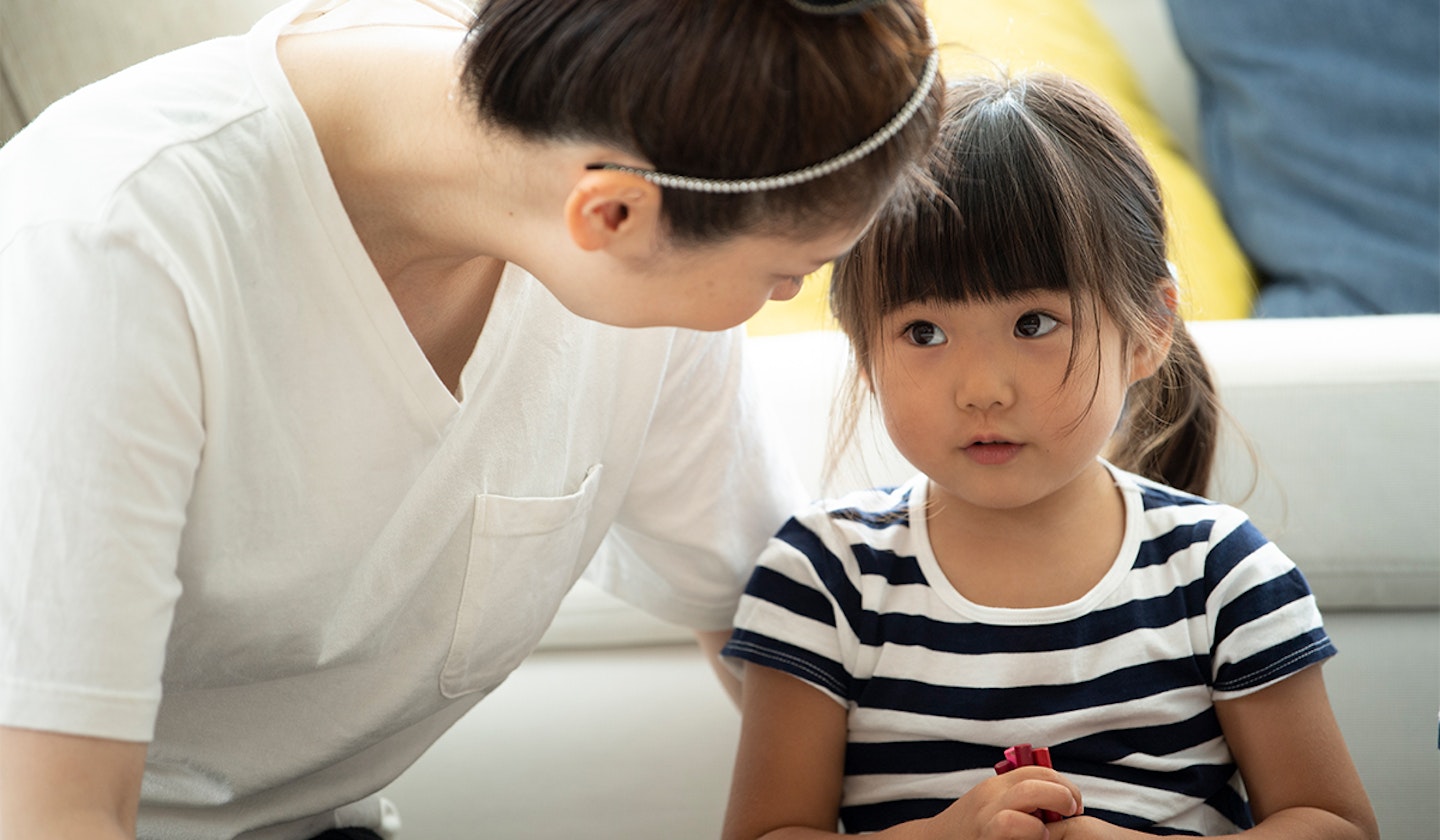For a long time, the idea of a blended family was considered rather taboo in the eyes of society. Until recent years, the 'traditional' picture of a family was considered the only 'normal' dynamic when it came to what a family looks like but of course we realise that is not at all true.
Family can be a rather complicated thing, and things don't always turn out how you may have intended. Whether that's down to tragedy or the breakdown of a relationship or divorce, there are many reasons mums and dads find themselves building a beautiful blended family.
If you've found yourself entering a blended family and need help navigating it, or simply want to know more about what this could mean for your family in the future, we've put together a simple guide on everything you need to know about blended families plus expert advice and guidance from Jennie Guay, author of Howie Blend and step-mum of two.
What is a blended family?
Blended families can look very different depending on your own personal circumstance. For some, it might be that your relationship breaks down following the birth of your children and you enter into a relationship with someone who also has children themselves making a big blended family where you take on some step children and your children gain some step siblings.
For others, like Kate and Rio Ferdinand for example, you may be embarking on starting a family with someone who has lost their partner. In this case, dealing with the grief of a family and navigating their emotions can be very difficult.
However your blended family looks, they all bring their own unique obstacles and challenges. It's normal for children to resist their new family dynamic and reject their step parents if things aren't handled sensitively, and this is rarely easy.
How to build a successful blended family

According to Jennie, building a successful blended family is all rooted in love. 'There's no blueprint for building a "successful family" and I don’t believe there is such a thing. At the end of the day, we all just want our kids and partners to be healthy, happy, and fulfilled. There will be pain, sadness, trials, and tribulations throughout the journey. It's how well you pull together as a family during the hard times that determines the strength of this bond. And when those times come, I always go back to the founding principles of kindness, courtesy, thoughtfulness, and communication. When it comes down to it, we all want to feel seen, heard, and validated within our families - whether we are 1-year-old or 100 years old.'
Consistency is key
If the children involved have witnessed several different step parents and the breakdown of these relationships, they're likely to reject new people coming into their lives. This can be especially difficult if they've made close bonds with their step parents and siblings before having them leave their lives forever.
That's why it's a good idea to only introduce your child to your new partner and their children (if they have any) once you've really gotten to know them and know you're both in it for the long-term.
Be civil
There are so many different reasons a relationship can break down, but if there are children involved, it's essential both parents keep things civil, especially around your children.
Be compassionate and respectful
Whatever your stepchildren have experienced, it's likely they've witnessed some conflict or emotional trauma in recent years, so it's unlikely you'll form instant bonds with them. It's important for you to understand what they've been through, have empathy and respect their boundaries.
That's another reason why you might want to wait a few years until entering another relationship as too much change at once can be mentally and emotionally challenging for anyone, especially children.
Remember that respect is a two way street, and if you're dealing with older children, it's important they know they must respect their parents and their new relationship too.
It's a journey
Patience is essential when it comes to building a blended family. It takes time to grow loving relationships and bonds and it's your responsibility to do what you can to nurture these relationships.
While family date days can be fun, it's okay to do everyday activities to get to know your new family dynamic. For example, a trip to the supermarket, a fun road trip or a fun shopping trip like IKEA could be a nice idea. It's in these everyday settings that you'll get to really know each other.
Decide on how you parent
It's a good idea to have an in-depth conversation with your partner about how you intend to parent in your blended family. Are you happy to let your partner discipline your child? How do you both feel about giving your children treats? There are many things that can be discussed in advance to moving in with your new family. It will make for a much smoother transition and limit the conflict between the grown-ups.
How to tell your children you've met someone new
This is often the bit that many single parents who are dating struggle with, but according to Jennie, it's all in the timing and understanding that you and your partner are in it for the long run.
'The first thing I advise is that you wait a significant amount of time before you introduce your kids to a new partner. More specifically, it's imperative that you and your new partner have the "future" talk and ensure that you are both in the relationship for the long haul and both parties understand that the children come first.
'Children require a secure and safe environment to thrive and develop. If there is instability within your relationship with your new partner, that will undoubtedly cascade onto the kids and negatively impact their development. Once you establish that your new partner is ready and it's an appropriate time to introduce the children to them, you should have a pre-emptive discussion with your children first. Don’t blindside them! Ensure that they are ready to meet this new person, as they will likely become a parental figure/fixture in their home. Explain who your partner is, what they do for work, and what kind of things you enjoy doing with them. Create connection points for your kids. For example, if your son enjoys riding bikes and your partner is into mountain biking, communicate this to him. This will reassure the kids that they will have things in common and provide them with points of reference and connection.
'Keep the discussion open and free of defensive language and allow your kids to ask questions. If they have concerns or reservations, don't be defensive! Acknowledge their feelings and listen.
'It's easy to get excited about your new partner, but remember that children, whilst resilient, need a routine. This new person in their lives will be creating change - that's not a bad thing, but they need to know their guardian (you) is secure.'

Ways to bond with your step-children
When telling your children about your new partner, it's a good idea to mention any similar interests that you think your children and your partner may bond over. For example, if they both like the same kind of music or if they share a favourite kind of food. These things can really help build the foundations of these relationships.
For younger kids, Jennie recommends really getting to know them.
'It's important to get to know your stepchildren before you jump in and begin parenting,' says Jennie. 'More importantly, they must get to know YOU. Dive into deeper conversations with the kids, ask them questions about themselves, and tell them stories about your life! Start to slowly help your partner with the day-to-day stuff like making the kids breakfast before school, helping with homework etc. Demonstrate to the kids that you want to be a part of their life for their everyday life, not just the dinners out and birthdays.'
How to help children adjust to the new norm
Communication is key here, as you really want to encourage your kids to feel like they can be honest with how they're feeling.
'The best thing to do is continuously check in with them and ask how they are doing. Ask them if there is anything about the new dynamic that makes them uncomfortable/confused/happy/sad etc. Whilst it's easy to just add your new partner into the activities you do as a family, make sure you keep some things the same. For instance, if on Sunday you and your son do a puzzle every morning, keep that tradition the same and then maybe do a family lunch later with your new partner. Another important task to remember during this process is keeping your child's school and teacher informed. They are your eyes and ears for the majority of your child’s day. If there is something off, they will be able to tell and having this open communication with the school will help you in ensuring your child is adjusting.'
How to deal with differences in parenting styles
Co-parenting: If you went through an amicable divorce and have created a healthy relationship with the other parent, then you are co-parenting. Agreeing on and keeping open communication about the child’s house rules, diet, bedtime, play dates and so on in both houses is crucial to creating a solid and secure base for your kids in both homes. They need to know that all parents are on the same page so they don’t play one against the other. Should you have differing ideas on the basic routines, then it’s important to sit down (or get on a call) and respectfully hear each other out. For bigger parenting differences, such as religion, education styles, etc., should you not be able to come to a compromise and respectfully hear each other out, then family counselling is a really good resource.
Parallel parenting: Should you not be able to be amicable with one another for whatever reason, you’ll find yourselves running separate households completely with little to no parental engagement. It can be next to impossible to navigate any equal footing or agree on any parenting approaches with someone who is reluctant to change. For example, you may find yourself in conflict with them over the simplest questions/topics/engagement etc. In this situation, it’s best to limit engagement. If you need to ask a question, keep it simple and to the point. Should you be dragged into more tension, don’t respond right away, leave it a day or two. If a response is warranted, make sure to keep it straight to the point without emotional undertones. If that parent is engaging you in a discussion that has little to do with the child, simply ignore the message. You always have to remind yourself to put the children first.
Step-parenting: If you and your new partner differ in parenting styles, it’s best to work this out before introducing your partner to the kids. Dive deep into each other’s pasts - ask each other how you were raised, what worked and what didn’t. What kind of home do you both want to create for yourself? What does that look like/include? What are your values? What are our approaches to discipline and teaching how actions have consequences - this question is most important and being on the same page is necessary. Once you’ve established the answers to these questions, you may not agree on everything, but you’ll have a full understanding of whether you are a good fit for parenting together and what aspects you need to continue discussing to ensure your parenting styles are aligned. It’s important to ensure that you are a team and there is parental cohesion in the household. Coming up with your own ‘rulebook’ is essential for the children not to be confused, to know what’s expected of them, and to ultimately feel safe and guided.
How to make sure your marriage or relationship doesn't suffer

'The things that keep a partnership going are kindness, courtesy, thoughtfulness and constant communication. I always say to my wife that we need to treat each other like we are trying to court one another to be each other’s best friend. Like when we were kids at school – everything stems from kindness. Make sure to check in with each other every day. There will be challenges with the children as it's a new dynamic for them.'
'Stepparents/partners will from time to time feel outside of your unit, or feel as if they don’t have a voice within the family dynamic. It’s key to let them know their parenting input is always valued. This may not mean you will put it into practice with the kids right away, but let them know their thoughts on parenting are valid.'
'It’s important to note that kids must respect any new element in the family dynamic and that your relationship with your partner is important to you too – so keep boundaries for yourself as well. Make sure there's never any undermining one another happening - especially in front of the kids or FROM the kids.'
What are some of the most common challenges blended families can face?
Every family is different, but one of the common challenges for all blended families is logistics. Honestly, balancing and managing the custody schedule, work schedules and family social schedules, school clubs, weekend activities and so on is a nightmare!
Sometimes there is an added layer of complexity and complication if you are not amicable with your ex, this could mean you are parallel parenting rather than co-parenting. This makes it extremely difficult for the kids to be able to participate in extracurricular activities as the other parent may not agree to it. The lack of co-parenting with an ex can cause tension and frustration not just for you, but the kids as well - they are the ones who usually suffer most in a circumstance like this.
Another challenge could be if step and half-siblings are added to the family dynamic. The different personalities, characteristics, and habits of each will mean more hurdles to overcome, but this is normal when merging into the household. Whilst this can be beautiful and create what I like to call "joyous chaos", it can also create tensions and challenges. Adults and parents must create an environment of open communication and respect where everyone feels seen and heard.
About the expert
Jennie is originally Canadian and moved to London in her late twenties to work in a 6-figure investor relations job in the City. Here she found herself finally comfortable with experimenting with her sexuality and switched her ‘looking for’ spec on Tinder from men to women and it was then she found her love and now wife Sam. The topic of Sam’s two children, with whom Sam has equal custody with her previous wife, was discussed naturally on their first date. When things got serious and Jennie met Frankie and Harry for the first time, she instantly fell in love.
Soon, Jennie left her corporate career where she enjoyed a life of nights out, frivolous shopping, girls’ holidays and brunches, Jennie started a new life in the Northern English countryside as a stepmum and her life changed drastically. This transition to being a stepmum gave Jennie a newfound purpose as a children’s book author when she realised that her stepchildren could not see their blended family reflected in their everyday reading and play. has a mission to inform parents and children on the normalities of blended families. Parent to children conversations about inclusion may be easy for one family but harder for another. Jennie wants to teach her audience that they too can have these conversations and it is healthy to do so!
Jennie and Sam had their wedding last year and Jennie also embarked on her IVF journey earlier this year to expand their beautiful, blended family.
